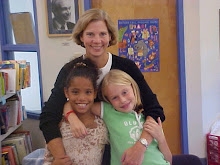How do we teach character traits? This is an interesting question. I see it play out so well in our independent schools and not necessarily so well in public schools - and why is that?
This article in Atlantic, How Kids Learn Resilience, really tries to get at why it's so hard to teach character in public schools. Part of the problem, the author says, lies in the things that children have learned from a young age at home - that set them up for success or failure early on, and part lies in the way our public schools typically reward and punish children and how ineffective that method is.
It is true that we are a self-selecting group in many ways in independent schools, with children who are already skewed to success - with the right kind of support at home to give them the tools for their future success. But I believe that at Parker, it is how we teach - and how we create a school culture - that is the difference maker when our results are compared with public schools - and even with other, less effective independent schools.
Last night was Project Night at Parker. In Pre K, children's sculpture, painting, narrated books and treasured art, were on display along with a slide show of their year of exploration and discovery. Jump down the hall to the gym, where our 8th grade students were giving their thesis presentations. This is a clear illustration of the "bookends" of a Parker education.
The autonomy, the fun and the exploratory nature of the Pre K leads directly to the ability of 13-year-olds to stand in front of an audience and succinctly and with passion, defend their reasoning about complex social justice issues that they chose to delve into - Gun Control, Racial Profiling, the Death Penalty, to name a few. The poise and confidence, the underlying resilience and perseverance to research and write a 15 - 20 page paper, and the intellectual and public-speaking chops that it took to accomplish the presentations is a testament to effective school culture. It is not an accident that Parker students can do this.
It is the result of giving students autonomy, support, and space to explore (and "fail"). It is the product of critique, self-evaluation and real responsibility. Students will be more likely to display positive academic habits when they are in an environment where they feel a sense of belonging, independence and growth is how Paul Tough puts it in the Atlantic article. It is the antithesis of traditional reward and punishment systems. It is beautiful to see.
Friday, May 20, 2016
Thursday, May 5, 2016
What are kids learning?
I asked this question today in our faculty meeting: How is the culture of the middle school right now? The math teacher piped up immediately, "We had a middle school meeting yesterday - and they are all good! There are no social issues!" We all laughed (because middle school life centers around social issues.) The Health teacher chimed in, "I am talking with the kids about stress in their lives and they said the same thing. Their friends are not stressors - their parents are! You know - bugging them to see their phones and getting too involved in their lives." Another chuckle from the faculty.
We tend to measure the subject-content of kids' learning - can they add detail to an essay or can they describe the water cycle? At Parker, we actually do try to measure some of the traits of a successful learner - like the ability to take intellectual risks or work independently, or cooperatively.
But I'm not sure we let parents know the most crucial things, like does their child have a passion to achieve or are they purposeful? Are they becoming better at negotiating social conflict? Do they stand up for their beliefs? Do we let parents know if their kids are measuring up to the school's motto?
Or - are all of these the wrong things to report to parents because, really, as the kids say, parents are getting just too involved in their lives anyway!
Wednesday, May 4, 2016
Playing in preschool
Here is a great article about why "playing" is so important in preschool - and really all through the elementary years: The Cruel and Pointless Push to Get Preschoolers "College and Career Ready". As the author says,
Play consolidates growth in social, cognitive and emotional realms and develops language, wonder and understanding of the world. It is an essential ingredient for future success and happiness.
Tuesday, May 3, 2016
I went to school today
Here are some photos and a video of some of the great experiences Parker kids have had in the past two weeks. STEM week for 6-7's; Philadelphia for 8's; a cooperative STEM activity for mixed age teams; and an exchange home-stay trip to our sister school, St. Peter's in Barcelona.
Kids faced many challenges: getting along with others far from home; speaking Spanish with families in Spain; researching space travel and launching rockets; creating videos to promote space tourism...to name just a few.
This is what "school" is like for Parker kids. It's not what most would envision when a child says "I went to school today." The learning is multi-dimensional, enlivening, challenging, and most of all engaging and fun. Self-sufficiency is required (and nurtured). Confidence in one's own ability to solve problems is the ultimate result. Is there a better preparation for whatever comes next in life?
Subscribe to:
Comments (Atom)







